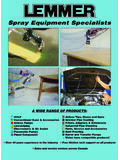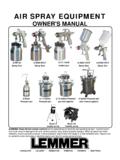Transcription of LL Case No 38/1935 - SAFLII
1 LL case No 38/1935 IN THE SUPREME COURT OF SOUTH AFRICA APPELLATE DIVISION In the matter between: PETER JOHN DUNCAN Appellant and THE MINISTER OF LAW AND ORDER FOR THE REPUBLIC OF SOUTH AFRICA Respondent CORAM: TRENGOVE, VILJOEN, VAN HEERDEN, BOSHOFF et JACOBS JJA HEARD: 6 MARCH 1986 DELIVERED: 24 MARCH 1986 JUDGMENT VAN HEERDEN JA VAN HEERDEN JA: With the leave of the court a quo this appeal is directed against the dismissal, with costs, of the appellant's claim for damages against the respondent. In setting out the factual background to the appeal I borrow to a large extent from the lucid summary appear-ing in the reported judgment of Van Dijkhorst J in the Transvaal Provincial Division (1984 (3) SA 460 (T)). In the early evening of 15 May 1982 a certain Mr Ruhsmann and his son, who were attending a f te at the Bryanston High School, were attacked by youths ap parently under the influence of alcohol or drugs.
2 One bumped into Ruhsmann and another knocked him to the ground. A third youth hit and kicked Ruhsmann's son. The assailants who were unknown to Ruhsmann and his son then left the scene. As a result of the attack on Ruhsmann his larynx was The incident was given considerable coverage .. 3. coverage by the media and pressure was brought to bear on the Randburg police to bring the villains to justice. On 17 June 1982 Detective Warrant Officer Esterhuyse took over the investigation of the matter. On the same day Detective Warrant Officer Bronkhorst received an anonymous telephone call from a young fe-male. She told Bronkhorst that the villains had driven away from the f te in a white Toyota van. She also said that she had recently seen the assailant of Ruhsmann driving that van and that she had then made a note of the registration letters and number, viz GHN 761 T.
3 Bronkhorst instructed Detective Sergeant Wiid to establish to whom the van belonged. Wiid obtained information that the vehicle had been sold to one Ochse. When Wiid made enquiries from Ochse, a youngster aged 17, he was told that he (Ochse) had in turn sold the van to the appellant's minor son, Noel. Ochse .. 4 Ochse was taken to the Randburg police station and in a statement taken on 18 June 1982 he said, with refer ence to an alleged conversation with Noel on 30 March 1982: "During our conversation he mentioned in slang that him and buddies, I presume, had a fight at a f te." On the previous day, i e, 17 June, Wiid had seen the van in question parked in front of the house in which Noel was living with his parents. He had reported this fact to Bronkhorst and at approximately 9 pm of that day the latter proceeded to the premises.
4 He was accompanied by Wiid and Detective Sergeant Lemmer He suspected Noel of having been one of the assailants and his intention was to question Noel for the purpose of ascertaining whether the latter had in fact been in volved in the assault on Ruhsmann. I shall revert to the events which ensued after the three policemen had gained .. 5. gained entry to the appellant's home. At this stage it suffices to mention that Bronkhorst eventually ar rested Noel and that the latter was taken to the Rand-burg police station. He was detained for approximately 48 hours until he was released in the early evening of 19 June. It was that arrest and detention that caused the appellant to institute action against the respon dent in the Transvaal Provincial Division. ' In his capacity as Noel's guardian he claimed damages for al leged unlawful, alternatively malicious, arrest and imprisonment.
5 It is not necessary to analyse the pleadings in any detail. In the respondent's plea the arrest and detention were admitted, as was the alle gation that the three policemen had acted within the course and scope of their employment with the respondent. It was denied, however, that they had acted unlawfully or maliciously. At the commencement of the trial it was .. 6. was made clear that apart from the question of damages, the only dispute was whether the arrest fell within the ambit of s 40 (1) (b) of the Criminal Procedure Act (51 of 1977) . I revert to the events of the evening of 17 June 1982. There were disputes about what was said by the dramatis personae, but the following findings of the trial judge have not been questioned on appeal: "After having identified himself and having introduced his colleagues, Bronkhorst entered the Duncan home and went to the bed room where the plaintiff, Noel's father, had indicated the conversation between Noel and the police should take place.
6 Bronkhorst proceeded to question Noel about the assault on Ruhsmann at the Bryanston High School f te on 15 May 1982. It was made clear to Noel that he was suspected of having been one of the assailants. Noel informed him that he was the owner of the Toyota panel van stand ing in front of the house. He also informed him that on the day of the fete in the late afternoon he had been at the school with the van, and that he knew about the assault. At this stage the plaintiff intervened and for bade him to say anything further. Noel com plied. Bronkhorst thereupon told him that should he refuse to answer he would have no alternative .. 7 alternative but to arrest him. Noel per sisted in his refusal and was thereupon arrested." Bronkhorst testified that when he arrested Noel he had already been told by Ochse of the remark made to the latter by Noel which was repeated in Ochse's written statement, and which has been quoted above.
7 It is clear that Bronkhorst's testimony was accepted by the court a_ quo and it was accordingly held that at the time of the arrest Bronkhorst had inter alia the follow ing information: a) The anonymous telephone call to the effect that the driver of the Toyota panel van had been one of the assailants. b) The fact that the van was the property of Noel at the time of the f te. c) Ochse's statement that Noel had told him that he had been involved in a fight at a f te. S 40 (1) (b) of the Criminal Procedure Act 51 of .. 8 of 1977 ("the present Act") empowers a peace officer to arrest without a warrant any person "whom he reasonably suspects of having com mitted an offence referred to in schedule 1, other than the offence of escaping from custody." It was common cause that Bronkhorst was a peace officer and that the assault on Ruhsmann consti tuted an offence referred to in schedule 1.
8 It was also common cause that the question whether a peace officer "reasonably suspects" a person of having com mitted an offence within the ambit of s 40 (1) (b) of the Act is objectively justiciable. And it seems clear that the test is not whether a policeman believes that he has reason to suspect, but whether, on an objec tive approach, he in fact has reasonable grounds for his suspicion (cf Watson v Commissioner of Customs and Excise 1960 (3) SA 212 (N) 216; R v Van Heerden 1958 (3) SA 150 (T) 152); Wiesner v Molomo 198 3 (3) SA 151 (A) 159. The .. 9. The first question which arose at the trial, was whether Bronkhorst reasonably suspected Noel of having taken part in the attack on Ruhsmann. This question was answered in the affirmative by the trial court which apparently found it unnecessary to deal with the incidence of the burden of proof.
9 The last, but not the final, word spoken by this Court on the onus in this regard, is to be found in Botha v Lues 1983 (4) SA 496 (A). In that case the court a quo had found that a party who alleges that an arrest was unlawful bears the onus of proving the absence of reasonable grounds for the relevant suspicion when the other party invokes a statutory justification for the arrest such as provided for by the subsection in question On appeal Corbett JA said (at p 502 A): "In die omstandighede van die onderhawige saak en, om die redes wat volg, ag ek dit nie nodig om uitsluitsel to gee oor hierdie geskil aangaande die ligging van die bewyslas met betrekking tot die regmatigheid van appellant se .. 10. se arrestasie nie. In die verbygaan wil ek egter daarop wys dat dit te betwyfel is of die beslissing van die Hof a_ quo tov die be-wyslas met sekere onlangse beslissings van hierdie Hof versoen kan word (sien Mabaso v Felix 1981 (3} SA 865 (A) te 872H-874B; Ramsay v Minister van Polisie en Andere 1981 (4) SA 802 (A) te 807E-F, 817F-818B).)
10 " For reasons which will appear, it is once again unnecessary to decide the question of the burden of proof in regard to the existence or absence of reasonable grounds for suspicion. I shall therefore assume in favour of the appellant that that onus rested on the respondent. I may point out, however, that the decision of this Court in S v Swanepoel 1985 (1) SA 576 (A), appears to repre-sent a formidable obstacle in the way of a contention that the arrestee bears the burden of proof. I should also mention at this stage that, as will be shown here-under, the onus in question is not the only one which is relevant for the purposes of this appeal. It would appear that in the court a quo counsel for .. 11. for the appellant did not argue that if Bronkhorst in deed had the information set out in (a) to (c) above at his disposal when arresting Noel, he yet would not have had reasonable grounds for suspecting Noel of com plicity in the attack on Ruhsmann.

















